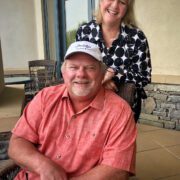HOW 3 DEDICATED SCIENTISTS GREW A MULTI-MILLION DOLLAR AGRICULTURE COMPANY FROM THE GROUND UP
Nematodes have caused farmers grief for decades. The tiny, parasitic worms feast on the roots of plants like soybeans, sugar beets and cotton, causing billions of dollars in crop damage every year.
Historically, the agricultural industry’s only available pest control options were highly-toxic pesticides like methyl bromide. The organophosphates took are of the nematode problem, but lingered in the environment and wiped out beneficial soil microbes in the process.
Scientists Dr. Kelly Smith, Tom Hewlett and Susan Griswold were determined to find a more targeted, environmentally-friendly way for farmers to protect their crops.
The benefits to agriculture and society in general would be enormous, said Dr. Smith, chief technical officer for Pasteuria Bioscience.
“There’s an estimate out there that says that up to 12 percent of food crop production around the world is lost to nematode damage every year,” Dr. Smith said. “Every year! If we could stop even a small portion of that, without changing anything else, that’s huge!”
The scientists suspected that Pasteuria spp., a naturally occurring soil bacteria that preys upon nematodes, might hold the answer— but it was thought to be impossible to cultivate in large quantities.
“Several famous studies were undertaken to tackle the problem, and all had failed before,” said Susan Griswold, laboratory manager for Pasteuria Bioscience.
But the team had hope: During their time at parent company Entamos, Inc. they tested a new technique and could visibly see that Pasteuria vegetative growth was occurring in their cultures for the first time.
“We thought: ‘Wow, we really can grow this stuff !” said Hewlett, senior scientist for Pasteuria Bioscience. The team left Entamos to form Pasteuria Bioscience, moving into the UF Sid Martin Biotechnology Incubator in 2003.
Progress was slow, but steady. “It was 2005 before we saw the development of the fi rst spores from fermentation that would attach to and grow inside a nematode,” said Griswold.
Background research was hard to come by because no one else had ever done it efore, said Dr. Kelly. “It was nerve-racking,” she said.
Her scientific curiosity and passion for learning kept her moving forward in times of uncertainty.
Her inspiration is as simple as it is genuine: “I really believe in this product,” she said earnestly. The technology is
a seamless solution for farmers–it doesn’t require new equipment or special handling like biologics–and it doesn’t harm the soil ecology, she said.
The team’s perseverance paid off .
After 11 years of late nights at the lab (and countless cups of coffee), the company was bought out by Syngenta, one of the world’s largest agricultural companies, for $113 million.
Pasteuria Bioscience has far out-grown its original lab space in incubator room 185: the once-tiny biotech startup has swelled to 21 full-time and eight part-time employees—up from the original three.
Their first commercial product with Syngenta will be delivered to U.S. soybean farmers early next year and released internationally soon after that, pending regulatory approvals.
It was an amazing journey for the trio.
“It is almost unbelievable to me that we have come from growing a few cells in a culture plate to growing and sporulating Pasteuria in large-scale fermentation that will be applied to millions of acres of crops,” said Hewlett, senior scientist for Pasteuria Bioscience.
Like most biocontrols, Pasteuria Bioscience’s product is not a panacea for farmers, Dr. Kelly said.
Their technology must be incorporated in an integrated management strategy to protect crops from all pests– but the product is a vital step toward safer, healthier and more sustainable agriculture. And that’s a cause more than worth the sleepless night and years of R&Dmore than worth the sleepless nights and years of R&D.


